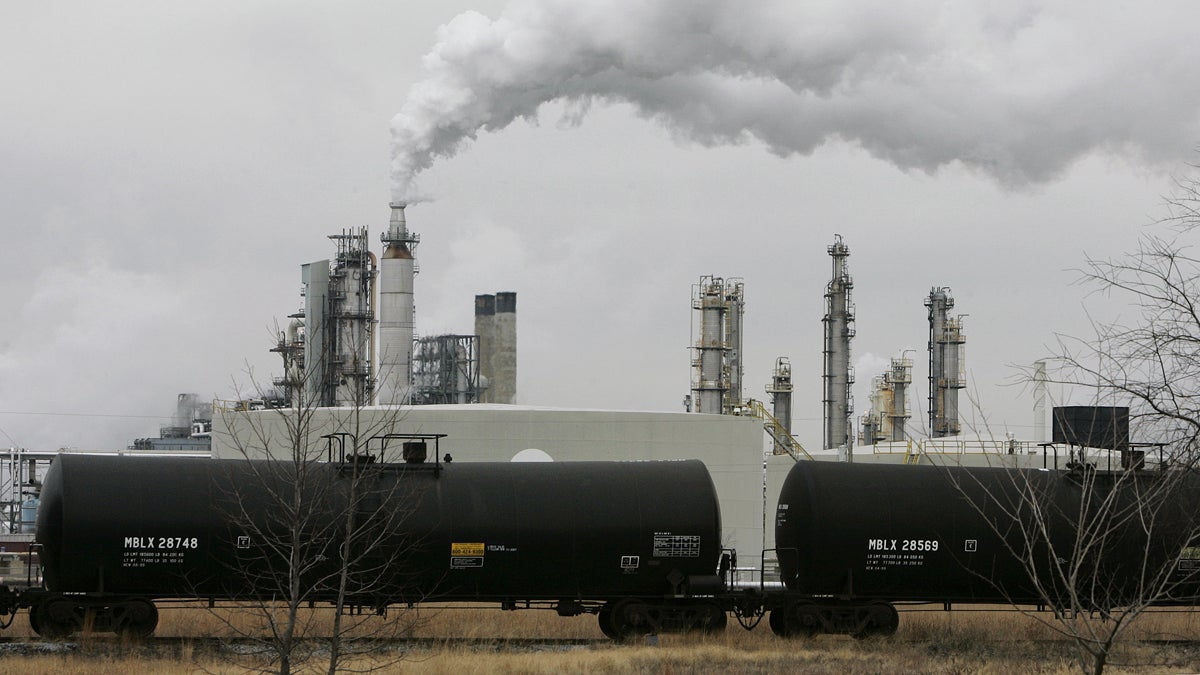South Jersey refinery says cost-mandated fuel credits threaten its survival
New Jersey lawmakers urge EPA to reform renewable-fuels standard for small refiners.

A 2008 File Photo of the Paulsboro Refinery, now owned by by PBF Energy (AP Photo/Mel Evans)
This story originally appeared on NJ Spotlight.
New Jersey lawmakers waded into a long-running battle by independent oil refiners for reform of a federal mandate that the companies say is costing them millions of dollars and threatening their survival.
Both the Senate and Assembly unanimously passed a resolution urging President Joe Biden and the Environmental Protection Agency to allow waivers to the Renewable Fuels Standard that would ease financial pressure on refiners such as Parsippany-based PBF Energy which employs about 225 people at a facility in Paulsboro.
To comply with the standard, PBF and other refiners who are unable to blend biofuels such as ethanol with gasoline and diesel are required instead to buy credits called Renewable Identification Numbers, or RINs, that have recently surged in price because they are traded on the open market.
Prices for the credits jumped to a record high of almost $2 in June from only 10 cents at the start of 2020, the resolution said. They are now the second-largest expense for refiners like PBF, after crude oil. The document noted that 800 million fewer credits were issued last year than were needed to meet the 2020 standard.
The burden of the credits is worsened, the independent refiners say, by the fact that they buy them from larger competitors who have the technical ability to blend biofuels, and so earn the credits that they can then sell to the smaller companies. That amounts to the smaller companies effectively subsidizing their competitors, they say.
The resolution says the requirement to buy credits is inflicting “serious economic harm” on independent refiners like PBF, and that the EPA has the authority to waive the renewable fuel requirements if it finds that they are hurting the companies.
Struggling with slim margins
“Many independent refiners already struggle with slim margins and the RFS program’s RIN requirements, as well as the manner in which the unregulated RIN market operates without oversight and subject to speculation and fraud, are currently inflicting serious economic harm on those businesses,” said the document, which was sent to the EPA and Biden.
In the first quarter of 2021, PBF spent $283 million on the credits, more than twice as much as the $123 million for all of 2019 and approaching the $325 million it spent for all of 2020, said spokesman Michael Karlovich.
Although the market price has recently dipped from its peak to around $1.50, the company’s costs will “significantly increase” this year unless EPA reforms the system, he predicted.
The agency could allow refiners to buy the credits from the government at a fixed price if the market price is too high, or require large-scale fuel-blenders to be responsible for meeting the RFS requirements rather than basing its mandate on refining capacity rather than blending capabilities.
“EPA has several tools in its toolbox to reduce RIN costs without adversely impacting consumption of domestically produced biofuel, and we are open to many potential solutions,” he said.
Even though the payments from Paulsboro itself ended when the company stopped making gasoline and diesel there late last year in response to the pandemic, PBF sends partially refined products to its refinery in Delaware, which pays for the credits, and is effectively part of the Paulsboro operation, Karlovich said.
The resolution’s sponsor, Assemblyman John Burzichelli (D- Gloucester), who represents Paulsboro, said he’s asking the EPA to stop the credits being traded as a financial instrument that has nothing to do with the Renewable Fuel Standard or the goal of increasing the use of renewable fuels.
A ‘completely artificial expense’
“These RINs are a completely artificial expense created by commodity brokers,” Burzichelli said. “They only exist in a trader’s world. The idea would be to get it out of the commodity market, not let it be traded that way, and figure out how to get an identification number that doesn’t place a financial burden on the process.”
Burzichelli said PBF is the only New Jersey refiner that is clearly affected by the requirement.
Although the refiners have been calling for reform for years, the resolution came up now because PBF asked the Legislature to add its voice in support of the company’s current talks with the EPA, Burzichelli said.
“They are telling us that their potential survival is being impacted by these RINs being traded almost as Bitcoin commodities,” he said. “It’s a question of whether they can afford to continue.”
Still, any replacement for the credits should not detract from the environmental goals of the Renewable Fuel Standard and should ensure the survival of independent refiners that keep the region supplied with refined products, especially during interruptions like the recent shutdown of the Colonial Pipeline, Burzichelli said.
“Even as we move toward a higher blend of clean energy, you have to have a bridge to get there. If the Colonial Pipeline had been shut down for a week longer and that refinery hadn’t been there, the impact of that would have been even more devastating,” he said.
The EPA said only that it is “working to get the RFS program back on track, and we continue to engage with all stakeholders in that effort.” The agency has previously said it is aware that this credit market is subject to manipulation, but has defended the renewables standard, saying it has played an important role in the development of biofuels.
Gov. Phil Murphy also called for a resolution to the credits issue in a June 1 letter to EPA Administrator Michael Regan. Murphy said the credits prices are now at their highest since 2013, adding to financial challenges stemming from a pandemic-related decline in the demand for gasoline and diesel.
Thousands of jobs ‘on the line’
While the pandemic cut demand for fuel, it did not result in a corresponding drop in the price of credits, Murphy said.
The Fueling American Jobs Coalition, a national group campaigning for reform of the Renewable Fuels Standard, welcomed the New Jersey resolution, as well as another bipartisan vote in support by the Pennsylvania Senate.
“With thousands of good-paying, family-sustaining refinery jobs in Pennsylvania and New Jersey on the line, it is encouraging to see continued momentum and growing, bipartisan support for RFS relief and reform,” the group said. An estimated 40% – 50% of U.S. refiners are thought to be reliant on the credits to comply with the EPA rule.
The company, which also operates refineries in Delaware and four other states, has repeatedly warned that its survival may depend on reform of the Renewable Fuels Standard. Still, its loss narrowed to $22.2 million in the first quarter of 2021 from a loss of $1.06 billion a year earlier as the economy picked up with the rollout of the coronavirus vaccines, it said in an earnings statement.
Last week, the U.S. Supreme Court made it easier for small refineries to obtain exemptions from renewable-fuel mandates, overturning a lower-court decision that criticized the EPA for extending waivers for refineries in several states.

Get daily updates from WHYY News!
WHYY is your source for fact-based, in-depth journalism and information. As a nonprofit organization, we rely on financial support from readers like you. Please give today.





